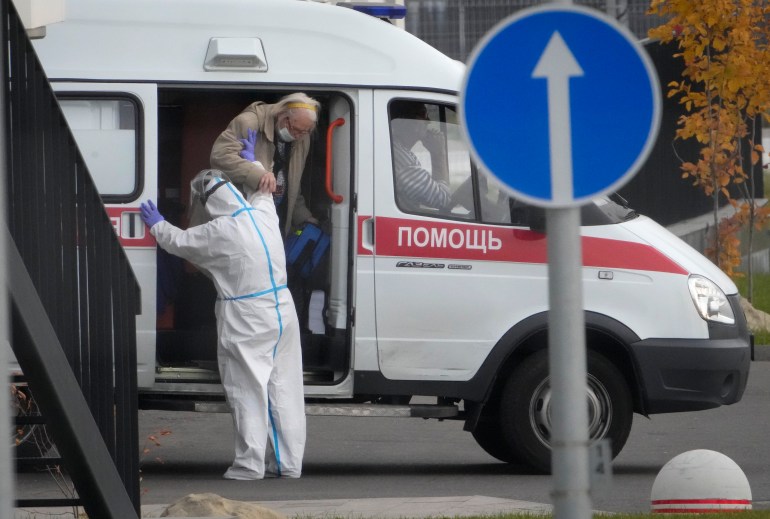Russia hits new record for daily COVID-19 deaths – 973
Government coronavirus task force reports 973 coronavirus deaths, the highest daily toll since the start of the pandemic.

Russia hit another record of daily coronavirus deaths on Tuesday as the country struggled with a rapid surge of infections and lagging vaccination rates. Authorities however have been adamant there will be no new national lockdown.
The government coronavirus task force reported 973 coronavirus deaths, the highest daily toll since the start of the pandemic in early 2020. Russia has repeatedly hit record daily death tolls this month, and daily infections also have been hovering near all-time highs with 28,190 new cases reported Tuesday.
Keep reading
list of 4 itemsBrazil’s Bolsonaro says he is ‘bored’ with COVID deaths questions
Southwest Airlines cancels more flights, denies COVID jab sickout
Merck seeks US authorisation for pill to treat COVID
Despite the rapidly mounting toll, the Kremlin has ruled out a nationwide lockdown, delegating the power to make decisions on toughening coronavirus restrictions to regional authorities.
The soaring infections have raised the pressure on Russia’s healthcare system with hospitals filling up quickly. Speaking at a cabinet meeting on Tuesday, Health Minister Mikhail Murashko said 11 percent of Russia’s 235,000 hospitalised COVID-19 patients were in serious or critical condition.

Overall, Russia’s coronavirus task force has registered more than 7.8 million confirmed cases and 218,345 deaths – the highest death toll in Europe.
Yet the state statistics agency Rosstat, which also counts deaths where the virus was not considered the main cause, has reported a much higher total – about 418,000 deaths of people with COVID-19.
If that higher number is used, Russia would be the fourth hardest-hit nation in the world during the pandemic, after the United States, Brazil and India. Even the lower mortality figure only shifts Russia down to fifth place after Mexico.
‘Explain all the advantages’
The Russian government has blamed the sharp rise in infections and deaths that began last month on a slow vaccination rate. Only 47.8 million Russians, or almost 33 percent of its nearly 146 million people, have received at least one shot of a coronavirus vaccine, and 42.4 million, about 29 percent, were fully vaccinated, the government said Friday.
Speaking at a meeting with newly-elected Russian lawmakers, Russian President Vladimir Putin emphasised on Tuesday the importance of broad vaccination and urged lawmakers to help encourage the population to get the shots.
“We must patiently and persistently work with people and explain all the advantages of prophylactics against that dangerous disease,” Putin said, noting that the population must be persuaded to get the shots without resorting to administrative pressure.
Some Russian regions have restricted attendance at large public events and limited access to theatres, restaurants, and other places to people who have been vaccinated, recently recovered from COVID-19, or tested negative in the previous 72 hours.
But life remains largely normal in Moscow, St Petersburg, and many other Russian cities, with businesses operating as usual and mask mandates loosely enforced. In Moscow, the authorities expanded free coronavirus tests in shopping malls, hoping it would help stem its spread.
Nasal spray vaccine
According to state documents published on Tuesday, Russia will test a nasal spray form of its Sputnik V vaccine against COVID-19 among adult volunteers.
Russia was quick to develop and launch its Sputnik vaccine when the coronavirus pandemic struck last year.
The nasal spray is to be applied in two doses in a clinic in St Petersburg, according to the document published on the state register of medicines, which did not provide the planned timing of the clinical tests.
Russian authorities said in June a nasal spray vaccine suitable for children aged 8-12 had been tested and the plan was to launch the new product in September.